人教新目标(Go for it)版九年级全册Unit 4 I used to be afraid of the dark. Section A 课件(共21张PPT)
文档属性
| 名称 | 人教新目标(Go for it)版九年级全册Unit 4 I used to be afraid of the dark. Section A 课件(共21张PPT) |
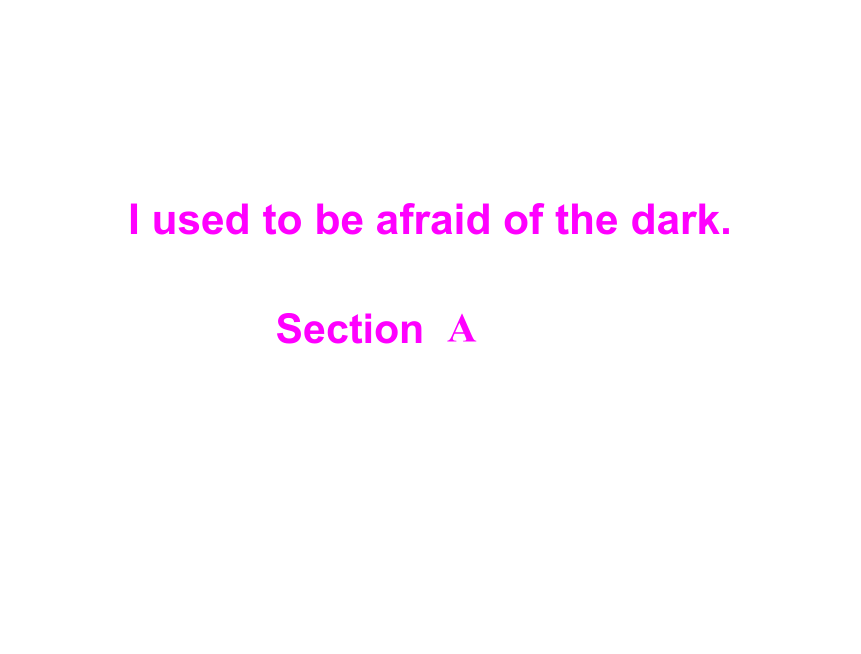
|
|
| 格式 | zip | ||
| 文件大小 | 159.0KB | ||
| 资源类型 | 教案 | ||
| 版本资源 | 人教新目标(Go for it)版 | ||
| 科目 | 英语 | ||
| 更新时间 | 2023-01-30 00:00:00 | ||
图片预览

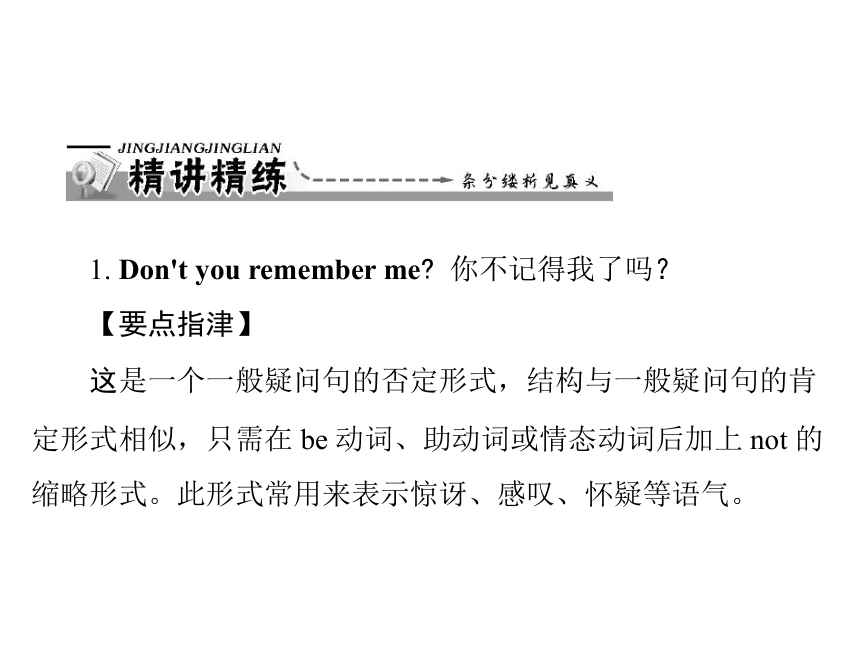
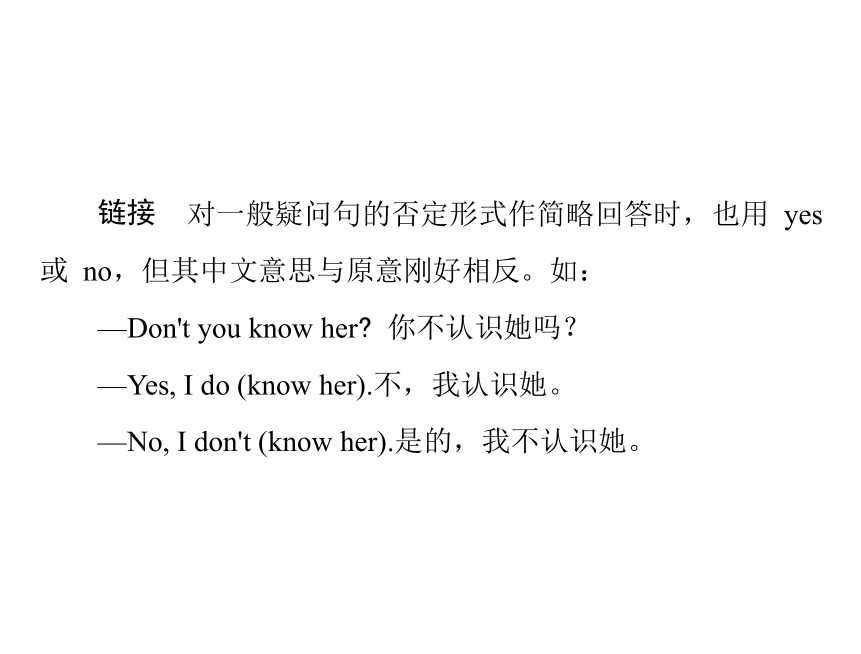
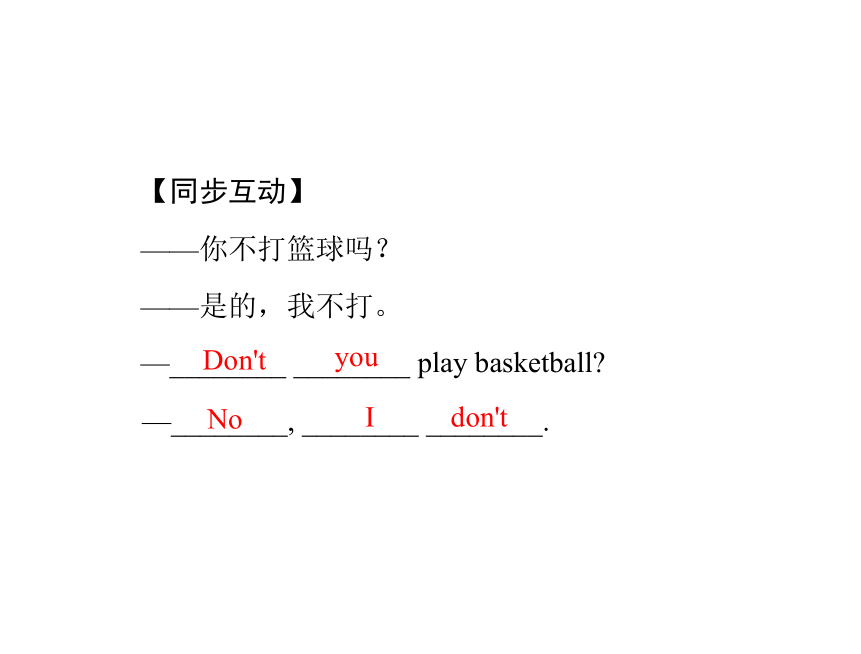
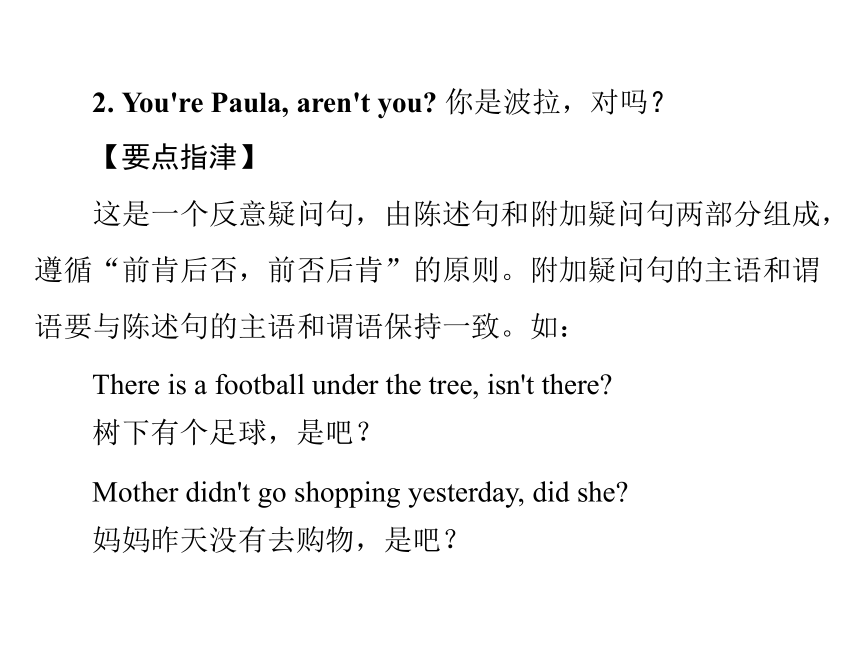
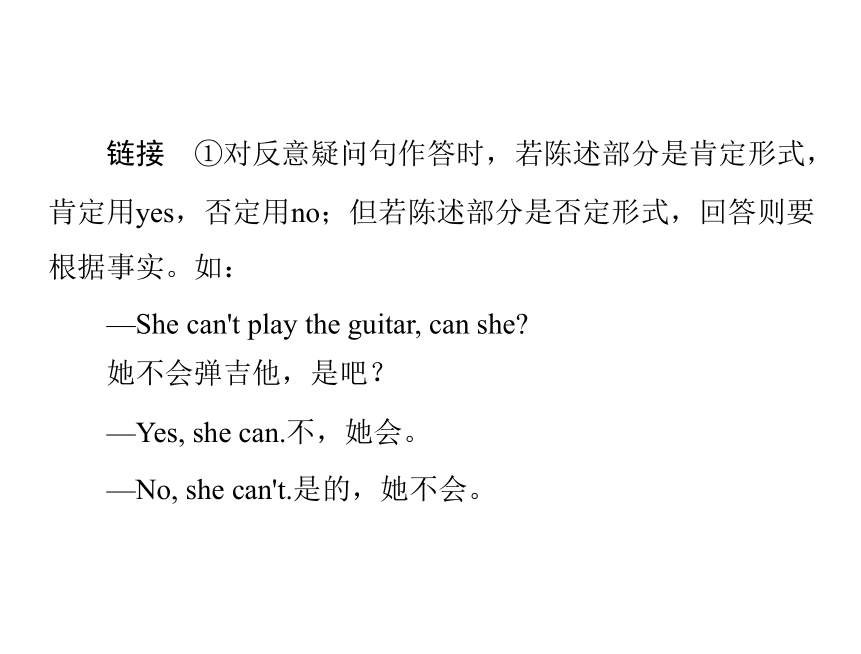
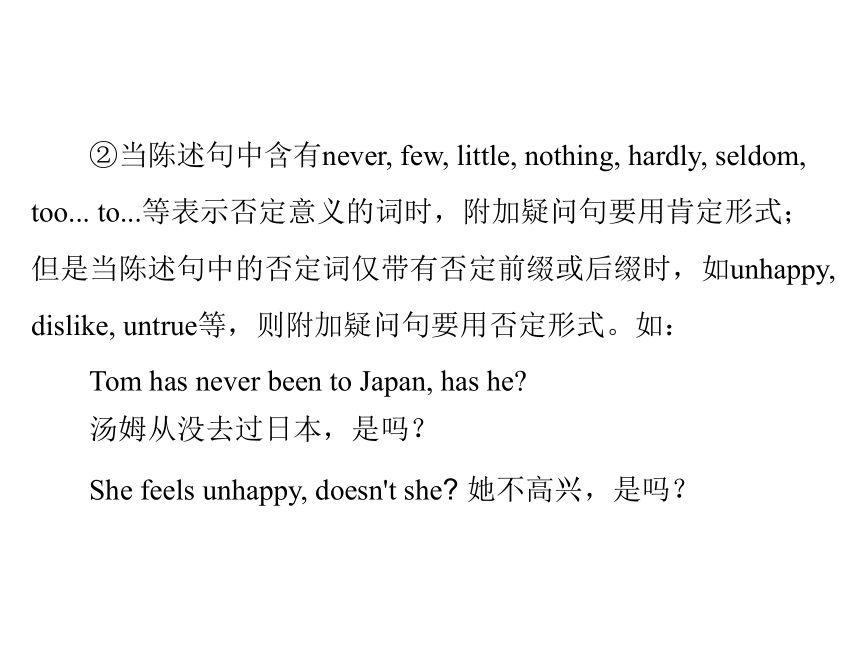
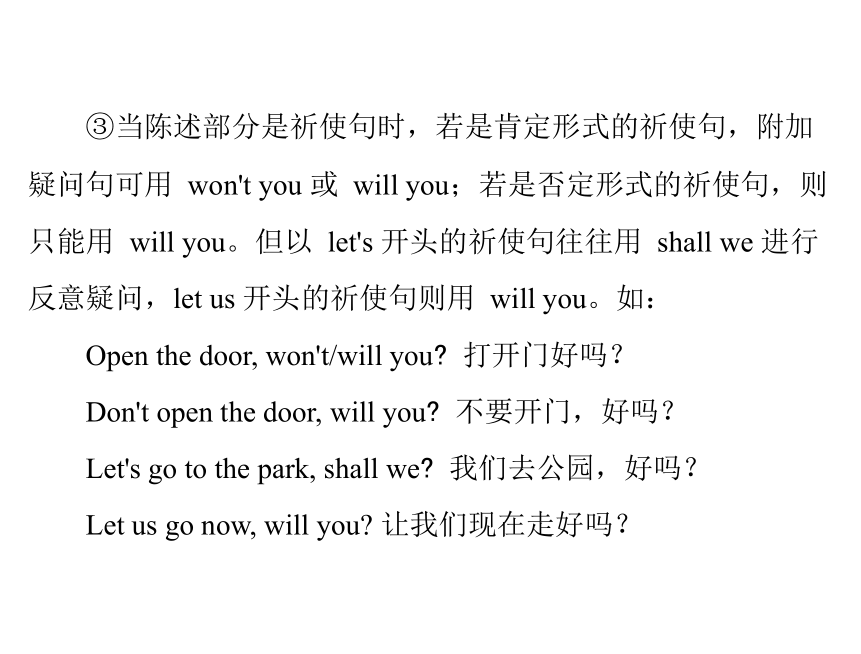
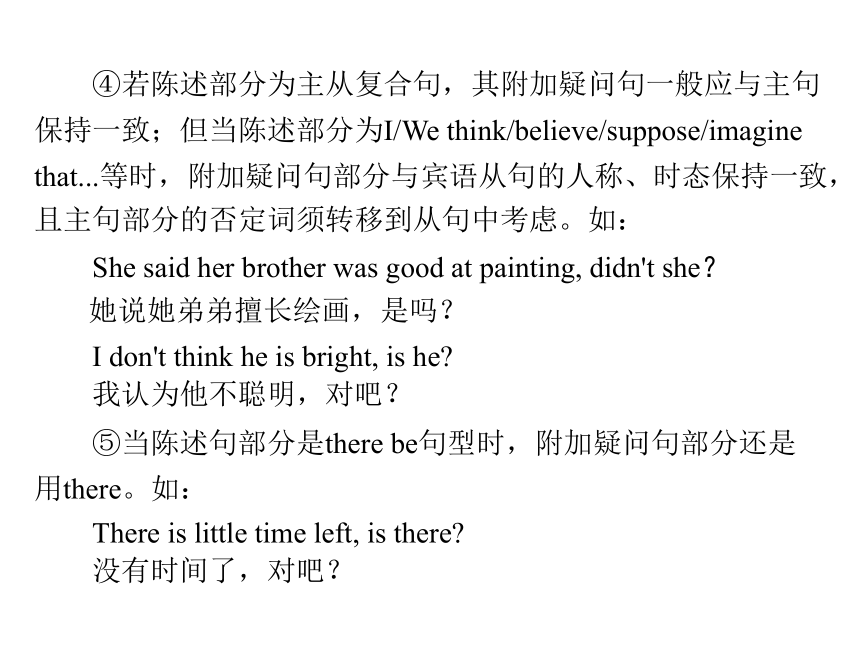
文档简介
(共21张PPT)
I used to be afraid of the dark.
Section
A
1. Don't you remember me 你不记得我了吗?
【要点指津】
这是一个一般疑问句的否定形式,结构与一般疑问句的肯
定形式相似,只需在 be 动词、助动词或情态动词后加上 not 的
缩略形式。此形式常用来表示惊讶、感叹、怀疑等语气。
链接
对一般疑问句的否定形式作简略回答时,也用 yes
或 no,但其中文意思与原意刚好相反。如:
—Don't you know her 你不认识她吗?
—Yes, I do (know her).不,我认识她。
—No, I don't (know her).是的,我不认识她。
【同步互动】
——你不打篮球吗?
——是的,我不打。
Don't
you
—________ ________ play basketball
No
—________, ________ ________.
I
don't
2. You're Paula, aren't you 你是波拉,对吗?
【要点指津】
这是一个反意疑问句,由陈述句和附加疑问句两部分组成,
遵循“前肯后否,前否后肯”的原则。附加疑问句的主语和谓
语要与陈述句的主语和谓语保持一致。如:
There is a football under the tree, isn't there
树下有个足球,是吧?
Mother didn't go shopping yesterday, did she
妈妈昨天没有去购物,是吧?
链接
①对反意疑问句作答时,若陈述部分是肯定形式,
肯定用yes,否定用no;但若陈述部分是否定形式,回答则要
根据事实。如:
—She can't play the guitar, can she
她不会弹吉他,是吧?
—Yes, she can.不,她会。
—No, she can't.是的,她不会。
②当陈述句中含有never, few, little, nothing, hardly, seldom,
too... to...等表示否定意义的词时,附加疑问句要用肯定形式;
但是当陈述句中的否定词仅带有否定前缀或后缀时,如unhappy,
dislike, untrue等,则附加疑问句要用否定形式。如:
Tom has never been to Japan, has he
汤姆从没去过日本,是吗?
She feels unhappy, doesn't she 她不高兴,是吗?
③当陈述部分是祈使句时,若是肯定形式的祈使句,附加
疑问句可用 won't you 或 will you;若是否定形式的祈使句,则
只能用 will you。但以 let's 开头的祈使句往往用 shall we 进行
反意疑问,let us 开头的祈使句则用 will you。如:
Open the door, won't/will you 打开门好吗?
Don't open the door, will you 不要开门,好吗?
Let's go to the park, shall we 我们去公园,好吗?
Let us go now, will you 让我们现在走好吗?
④若陈述部分为主从复合句,其附加疑问句一般应与主句
保持一致;但当陈述部分为I/We think/believe/suppose/imagine
that...等时,附加疑问句部分与宾语从句的人称、时态保持一致,
且主句部分的否定词须转移到从句中考虑。如:
She said her brother was good at painting, didn't she?
她说她弟弟擅长绘画,是吗?
I don't think he is bright, is he
我认为他不聪明,对吧?
⑤当陈述句部分是there be句型时,附加疑问句部分还是
用there。如:
There is little time left, is there
没有时间了,对吧?
⑥当陈述句的主语是不定代词something, anything, nothing,
everything 时,附加疑问句的代词用it; 当陈述句的主语是不定
代词someone, anyone, everyone, somebody, everybody, nobody等
时,附加疑问句的代词可用they或he,但要注意动词的数与they
和he保持一致。如:
Everything is ready, isn't it
一切都准备好了,对吧?
Nobody prefers to listen to the boring lecture, do they/does he?
没人愿意听这个无聊的报告,对吧?
【同步互动】
①I hear the tall girl wearing glasses is your new classmate.
She's from America, ________ (2011年广东广州)
B
A. has she
C. hasn't she
B. isn't she
D. does she
解析:因陈述句部分为肯定形式,且动词为 is,故用 isn't
进行反意疑问。
②—There is some beef in the fridge, ________
—Yes, there is.(2010年广东湛江)
B
A. is there
C. has there
B. isn't there
D. hasn't there
解析:there be句型的反意疑问句主语还是there; 陈述句为
肯定句,be动词是is,因此反意疑问句用isn't there。
③Billy had a great time the day before yesterday, _______
(2011年重庆江津)
A. hadn't he
C. wouldn't he
B. wasn't he
D. didn't he
解析:had 是实义动词,因是过去式,所以借助助动词 did;
又因陈述句为肯定形式,故用 didn't 反问。
D
④—You come from England, don't you
—________. How do you know that (2011年浙江金华)
A. No, I do
B. No, I don't
C. Yes, I am
D. Yes, I do
D
解析:根据答语可知是来自英国,所以用yes回答,且come
是实义动词,故用助动词do。
⑤Let us have a picnic this weekend, ________
A. don't you
B. do you
C. shall we
D. will you
D
⑥You brother can hardly walk after the accident, ________
C
A. does he
C. can he
B. doesn't he
D. can't he
解析:陈述句部分含有表示否定的词 hardly,且助动词为
can,故反意疑问句用 can't。
解析:Let us...祈使句的反意疑问句用will you。
⑦We don't believe that he will be successful, ________
A. don't we
B. do we
C. won't he
D. will he
D
解析:陈述句部分是We don't believe...主从复合句,故反意
疑问句应与从句的人称、时态保持一致;又因主句是否定形式,
故应把否定词转移到从句中。从句的主语为 he,助动词为 will,
故选 D。
used to的用法
used to 意为“过去经常;以前常常”,后接动词原形,
表示过去的习惯或状态。其否定式和疑问式常借助助动词did。
如:
He used to live in a flat when he was here.
他在这儿时曾住在一所公寓里。
They didn't use to like playing the piano.
他们以前不喜欢弹钢琴。
Did he use to be a teacher
他曾经是一名教师吗?
链接
①be/get used to (doing) sth. 意为“习惯于(做)某
事”,其中to是介词,后可接名词或动名词作宾语。如:
I am used to getting up early and going to bed early.
我习惯早睡早起。
②be used to do/for doing sth.意为“被用来做某事”。如:
Pens are used to write/for writing.笔用来写字。
③be used by sb.意为“被某人使用”。如:
Pens are used by people.笔被人们使用。
④be used as 意为“被当作……来使用”。如:
Pens are used as a tool.笔被当作一种工具来使用。
【同步互动】
①—How does Jack usually go to school
—He ________ ride a bike, but now he ________ there to lose
weight.(2011年山东烟台)
A. used to; is used to walk
D
B. was used to; is used to walking
C. was used to; is used to walk
D. used to; is used to walking
解析:答语意为“过去他常常骑自行车,但现在为了减肥,
他习惯了步行上学”。used to (do)过去常常;be used to doing
sth.习惯于做某事。
②Knives ________ cutting things.
A
A. are used for
C. are used by
B. are used to
D. are used as
解析:题意:刀是用来切东西的。be used for doing sth./to do
sth.被用来做某事;be used by被……使用;be used as 被当作……
来使用。
③Lily used to sleep with her parents.(改为一般疑问句)
________ Lily________ to sleep with her parents
④Jack used to go to bed early.(改为否定句)
Jack ________ ________ to go to bed early.
⑤You used to be afraid of being alone, _______ ________
(完成反意疑问句)
Did
use
didn't
use
didn't
you
I used to be afraid of the dark.
Section
A
1. Don't you remember me 你不记得我了吗?
【要点指津】
这是一个一般疑问句的否定形式,结构与一般疑问句的肯
定形式相似,只需在 be 动词、助动词或情态动词后加上 not 的
缩略形式。此形式常用来表示惊讶、感叹、怀疑等语气。
链接
对一般疑问句的否定形式作简略回答时,也用 yes
或 no,但其中文意思与原意刚好相反。如:
—Don't you know her 你不认识她吗?
—Yes, I do (know her).不,我认识她。
—No, I don't (know her).是的,我不认识她。
【同步互动】
——你不打篮球吗?
——是的,我不打。
Don't
you
—________ ________ play basketball
No
—________, ________ ________.
I
don't
2. You're Paula, aren't you 你是波拉,对吗?
【要点指津】
这是一个反意疑问句,由陈述句和附加疑问句两部分组成,
遵循“前肯后否,前否后肯”的原则。附加疑问句的主语和谓
语要与陈述句的主语和谓语保持一致。如:
There is a football under the tree, isn't there
树下有个足球,是吧?
Mother didn't go shopping yesterday, did she
妈妈昨天没有去购物,是吧?
链接
①对反意疑问句作答时,若陈述部分是肯定形式,
肯定用yes,否定用no;但若陈述部分是否定形式,回答则要
根据事实。如:
—She can't play the guitar, can she
她不会弹吉他,是吧?
—Yes, she can.不,她会。
—No, she can't.是的,她不会。
②当陈述句中含有never, few, little, nothing, hardly, seldom,
too... to...等表示否定意义的词时,附加疑问句要用肯定形式;
但是当陈述句中的否定词仅带有否定前缀或后缀时,如unhappy,
dislike, untrue等,则附加疑问句要用否定形式。如:
Tom has never been to Japan, has he
汤姆从没去过日本,是吗?
She feels unhappy, doesn't she 她不高兴,是吗?
③当陈述部分是祈使句时,若是肯定形式的祈使句,附加
疑问句可用 won't you 或 will you;若是否定形式的祈使句,则
只能用 will you。但以 let's 开头的祈使句往往用 shall we 进行
反意疑问,let us 开头的祈使句则用 will you。如:
Open the door, won't/will you 打开门好吗?
Don't open the door, will you 不要开门,好吗?
Let's go to the park, shall we 我们去公园,好吗?
Let us go now, will you 让我们现在走好吗?
④若陈述部分为主从复合句,其附加疑问句一般应与主句
保持一致;但当陈述部分为I/We think/believe/suppose/imagine
that...等时,附加疑问句部分与宾语从句的人称、时态保持一致,
且主句部分的否定词须转移到从句中考虑。如:
She said her brother was good at painting, didn't she?
她说她弟弟擅长绘画,是吗?
I don't think he is bright, is he
我认为他不聪明,对吧?
⑤当陈述句部分是there be句型时,附加疑问句部分还是
用there。如:
There is little time left, is there
没有时间了,对吧?
⑥当陈述句的主语是不定代词something, anything, nothing,
everything 时,附加疑问句的代词用it; 当陈述句的主语是不定
代词someone, anyone, everyone, somebody, everybody, nobody等
时,附加疑问句的代词可用they或he,但要注意动词的数与they
和he保持一致。如:
Everything is ready, isn't it
一切都准备好了,对吧?
Nobody prefers to listen to the boring lecture, do they/does he?
没人愿意听这个无聊的报告,对吧?
【同步互动】
①I hear the tall girl wearing glasses is your new classmate.
She's from America, ________ (2011年广东广州)
B
A. has she
C. hasn't she
B. isn't she
D. does she
解析:因陈述句部分为肯定形式,且动词为 is,故用 isn't
进行反意疑问。
②—There is some beef in the fridge, ________
—Yes, there is.(2010年广东湛江)
B
A. is there
C. has there
B. isn't there
D. hasn't there
解析:there be句型的反意疑问句主语还是there; 陈述句为
肯定句,be动词是is,因此反意疑问句用isn't there。
③Billy had a great time the day before yesterday, _______
(2011年重庆江津)
A. hadn't he
C. wouldn't he
B. wasn't he
D. didn't he
解析:had 是实义动词,因是过去式,所以借助助动词 did;
又因陈述句为肯定形式,故用 didn't 反问。
D
④—You come from England, don't you
—________. How do you know that (2011年浙江金华)
A. No, I do
B. No, I don't
C. Yes, I am
D. Yes, I do
D
解析:根据答语可知是来自英国,所以用yes回答,且come
是实义动词,故用助动词do。
⑤Let us have a picnic this weekend, ________
A. don't you
B. do you
C. shall we
D. will you
D
⑥You brother can hardly walk after the accident, ________
C
A. does he
C. can he
B. doesn't he
D. can't he
解析:陈述句部分含有表示否定的词 hardly,且助动词为
can,故反意疑问句用 can't。
解析:Let us...祈使句的反意疑问句用will you。
⑦We don't believe that he will be successful, ________
A. don't we
B. do we
C. won't he
D. will he
D
解析:陈述句部分是We don't believe...主从复合句,故反意
疑问句应与从句的人称、时态保持一致;又因主句是否定形式,
故应把否定词转移到从句中。从句的主语为 he,助动词为 will,
故选 D。
used to的用法
used to 意为“过去经常;以前常常”,后接动词原形,
表示过去的习惯或状态。其否定式和疑问式常借助助动词did。
如:
He used to live in a flat when he was here.
他在这儿时曾住在一所公寓里。
They didn't use to like playing the piano.
他们以前不喜欢弹钢琴。
Did he use to be a teacher
他曾经是一名教师吗?
链接
①be/get used to (doing) sth. 意为“习惯于(做)某
事”,其中to是介词,后可接名词或动名词作宾语。如:
I am used to getting up early and going to bed early.
我习惯早睡早起。
②be used to do/for doing sth.意为“被用来做某事”。如:
Pens are used to write/for writing.笔用来写字。
③be used by sb.意为“被某人使用”。如:
Pens are used by people.笔被人们使用。
④be used as 意为“被当作……来使用”。如:
Pens are used as a tool.笔被当作一种工具来使用。
【同步互动】
①—How does Jack usually go to school
—He ________ ride a bike, but now he ________ there to lose
weight.(2011年山东烟台)
A. used to; is used to walk
D
B. was used to; is used to walking
C. was used to; is used to walk
D. used to; is used to walking
解析:答语意为“过去他常常骑自行车,但现在为了减肥,
他习惯了步行上学”。used to (do)过去常常;be used to doing
sth.习惯于做某事。
②Knives ________ cutting things.
A
A. are used for
C. are used by
B. are used to
D. are used as
解析:题意:刀是用来切东西的。be used for doing sth./to do
sth.被用来做某事;be used by被……使用;be used as 被当作……
来使用。
③Lily used to sleep with her parents.(改为一般疑问句)
________ Lily________ to sleep with her parents
④Jack used to go to bed early.(改为否定句)
Jack ________ ________ to go to bed early.
⑤You used to be afraid of being alone, _______ ________
(完成反意疑问句)
Did
use
didn't
use
didn't
you
同课章节目录
- Unit 1 How can we become good learners.
- Section A
- Section B
- Unit 2 I think that mooncakes are delicious!
- Section A
- Section B
- Unit 3 Could you please tell me where the restroom
- Section A
- Section B
- Unit 4 I used to be afraid of the dark.
- Section A
- Section B
- Unit 5 What are the shirts made of?
- Section A
- Section B
- Review of Units 1-5
- Unit 6 When was it invented?
- Section A
- Section B
- Unit 7 Teenagers should be allowed to choose their
- Section A
- Section B
- Unit 8 It must belong to Carla.
- Section A
- Section B
- Unit 9 I like music that I can dance to.
- Section A
- Section B
- Unit 10 You're supposed to shake hands.
- Section A
- Section B
- Review of Units 6-10
- Unit 11 Sad movies make me cry.
- Section A
- Section B
- Unit 12 Life is full of the unexpected
- Section A
- Section B
- Unit 13 We're trying to save the earth!
- Section A
- Section B
- Unit 14 I remember meeting all of you in Grade 7.
- Section A
- Section B
- Review of Units 11-14
